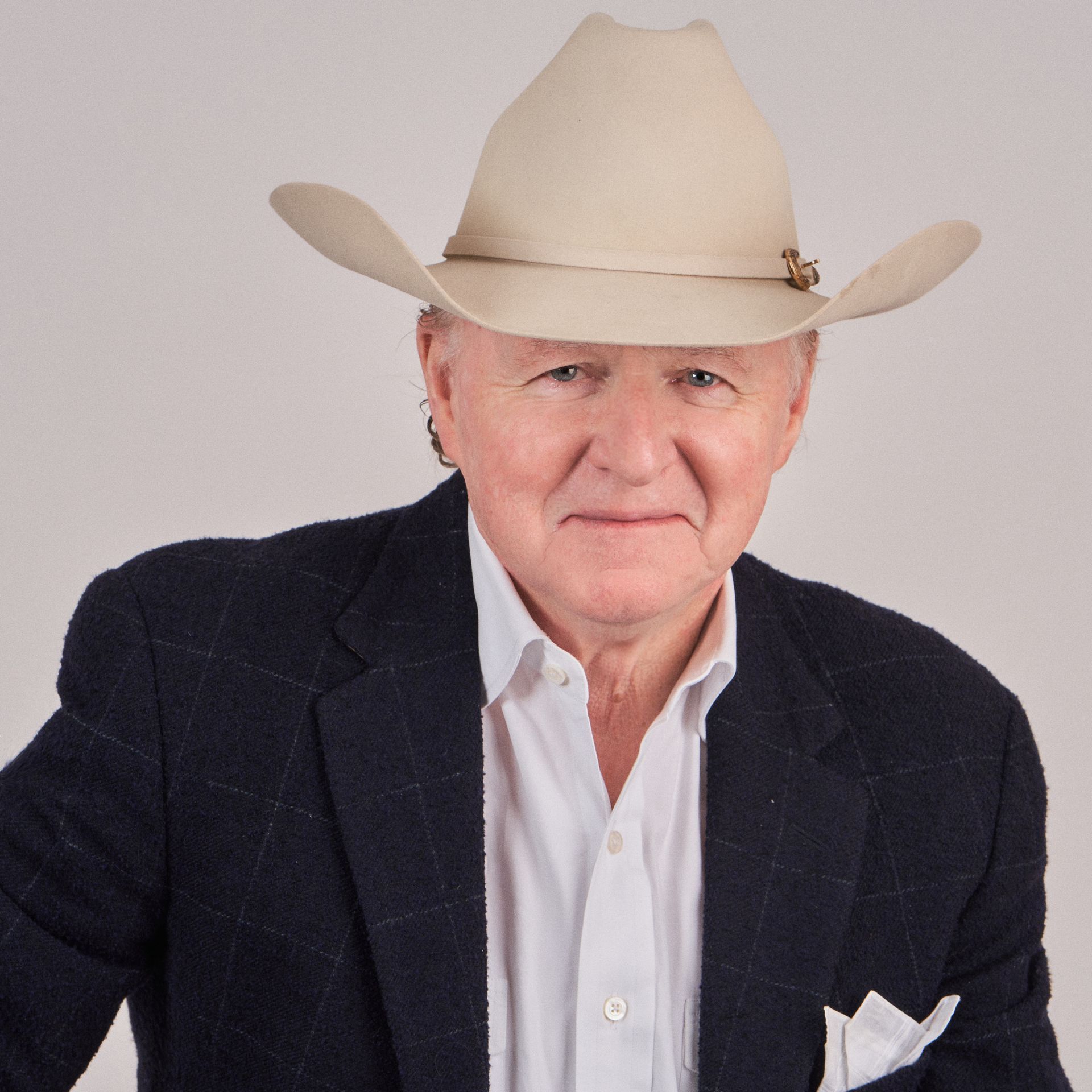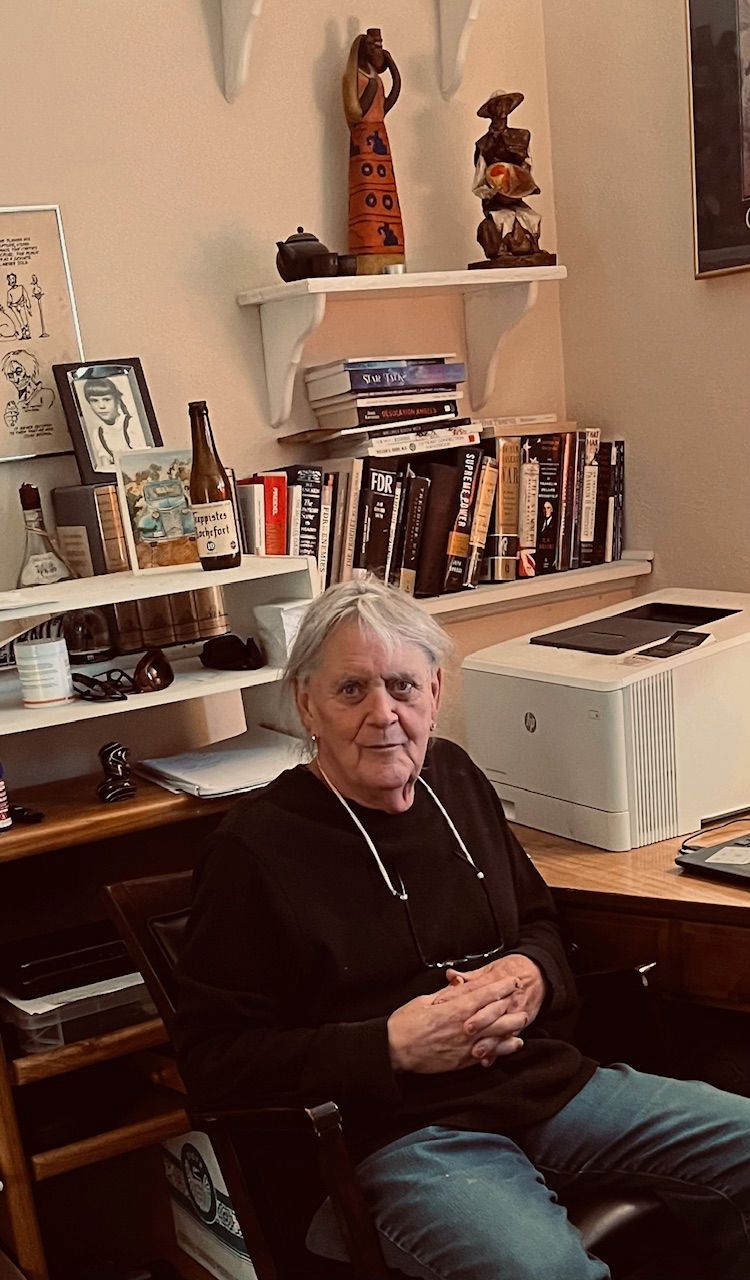Thursday's Columns
August 14, 2025
Special Edition
of
The Periodic News
After Many Years,
Gauthier and Connor
Reappear
On the Same Page
The
Flood
By
Richard Connor
New Mexico Correspondent
The Westphalia Periodic News

Richard Connor
CEO, El Rito Media
The Old editor pulled out
the old Underwood
and banged out a piece...
As darkness fell over the Sacramento Mountains above Ruidoso, a shawl of silvery mist draped the peaks’ shoulders in a cloak that looked Heavenly.
Below sat Hell.
Earlier in the day the Rio Ruidoso violently leapt over its banks, sending trees, trucks, dumpsters, televisions, washing machines, and even an entire house through the Village of Ruidoso in the worst flood in its history.
Worse than all the debris, three people were swept to their deaths – two children, a 4-year-old girl and her 7-year-old brother after their father heroically tried but was unable to save them. The third fatality was reportedly a middle-aged man.
All three were in an RV Park.
The river rose 20 feet in 30 minutes with speed and violent, malevolent fury, chugging and roaring like an out-of-control freight train.
Shockingly, the total rainfall – just 1 to 2-plus inches – might not seem like a menacing amount. But it was enough to terrify Ruidoso and haunt the memories of those who lived through it for a lifetime. Nightmares and post-traumatic stress syndrome left behind by last year’s wildfires and floods are now part and parcel of the mindset of this community forever.
Many hundreds of homes and buildings were either lost, destroyed, or heavily damaged in Tuesday’s flooding.
Heroes stepped forward and did their part and more. There were at least 65 swift-water rescues.
But this date, July 8, 2025, will mark a calendar of eternal horror for Ruidoso. Folks will say to one another as they attempt to find a date in their mind, “Was that before the flood or after?”
Village Mayor Lynn Crawford has an inspiring and hopeful message in a letter on this page.
He writes prophetically of plans to come back, as we did from last summer’s disasters: “We are not just talking about rebuilding structures; we are talking about rebuilding hope.”
Properly, he praises the good works of volunteers and first responders, as well as good deeds among neighbors. He also sends the message residents and visitors need to hear – do not let this violence of nature, the byproduct of the Salt Fire, proscribe how we move forward with our lives.
“We have seen acts of kindness and courage that remind us why we love this place,” he writes, “and why we will not let this disaster define us.”
No, we will not be defined by tragedy and fear.
The reality of Ruidoso is that, in fact, there is a heaven and hell present every day. We have the mountain air, the breathtaking vistas, the streams and rivers that represent so much, not only in myth but in reality. Water means life. Streams run free and clean. Water baptizes and frees us. They are the continuity of life itself. Sometimes, yes sometimes, they turn on us as they did on Tuesday.
We live in small-town America, a mountain town that offers a slice of Heaven and we live with the knowledge that fires and floods –biblical disasters, historically – threaten at any moment a modern-day Hell.
Grasp those you love, hold them ever so close to your bosom, feel their beating hearts, look into their eyes and rejoice in your blessings. Marvel at your home and the roof over your head. Then, grab your shovel, your pick and your hoe, and get back to work rebuilding what was lost. And strengthen our community for the future.
--30--
Our
Story
by
Lawrence Abby Gauthier
ace reporter
Westphalia Periodic News

Lawrence Abby Gauthier
CEO, Westphalia Publishing
Thinking About
My Old Boss
Richard Connor
I could have had a normal life had it not been for the luck of the draw.
Something newspaper reporters hate to do is candidate interviews in the run-up to general elections. What’s your position on this or that? Repeat after me.
When you throw school boards, county commissions, city councils, judges, state and national reps into the mix, there can be dozens of candidates in races in a newspaper’s coverage area. It’s a big job for a newsroom staff to interview all of them. Everybody has to chip in, from the sports and “social” stuff staff, to police beat reporters and investigators.
In 1978, Richard Connor was the managing editor at the Oakland Press in Pontiac, Michigan, in Oakland County, on the northern fringes of Detroit, where America’s big cars were manufactured in sprawling manufacturing plants.
Rich (as I called him) and I had started out together at a small-town daily on the Michigan/Indiana border. He kept moving up the organizational ladder and to bigger newspapers and always brought me along with him. I never had any desire to be anything other than a beat reporter.
It was Connor’s job to assign the candidate interviews to reporters from the different departments. Because he knew that nobody liked to do it, he wrote the names and party affiliations of all the candidates on slips of paper, put them in a bag and went around the newsroom where everybody grumbled as they reached into the bag to pull out a name.
The 1978 mid-term election for Congress was coming up. I drew the name of Andy Rothstein. I looked up at Connor. “Who's he?"
“Affiliated with something called the U.S. Labor Party,” he said. “It's on your slip of paper."
I grumbled. “Damn it, Rich, I’m in the middle of something big, some big new leads in the Hoffa case and I can’t just…” He just moved on like he was in no mood to argue. He was the boss.
I made some phone calls and managed to arrange a date and time for Andy Rothstein to come into the newspaper for an interview.
I was hung over and feeling pretty rough the morning he showed up with two affiliates, I think you could call them. I still remember their names: Glenn Mesaros and Gerald Pechenuk. A few years later, in 1985, Mesaros would run unsuccessfully for Mayor of Minneapolis. I recently noticed on Facebook that Gerald’s wife, Mindy, is running for a city council seat in Oakland, California.
I ushered them into a small meeting room. I sat on one side of a rectangular table and the three of them sat together facing me from the other side.
First question for Rothstein: If elected to Congress, what are you going to do about the energy crisis?
Energy, or how we move, was the biggest news story in Detroit at the time, pushing even Hoffa off the front page. A National Energy Crisis had been declared. An Energy Czar appointed. The world was running out Energy. Everybody knew it was true. In the newsroom, we took it as a given because The New York Times said it was so. Even Cronkite.
The story first broke in 1972 when the Rockefeller Foundation’s “Limits to Growth” study came out. It concluded that we were at the summit of a Bell Curve of Peak Oil, a finite commodity, our main source of energy, and that we were starting the long slide down the other side and would have to start making do with less and less of American pie in order to at least postpone, if nothing else, the inevitable equilibrium of entropic death, when everything was in perfect balance and nothing moved. The idea would reshape the culture. Best to get what’s to be gotten in the moment, in the now.
As soon as the Rockefeller study was released, The Times played the story up big with a front page, above-the-fold banner headline. Columnist Anthony Lewis called it the "biggest story of the 20th Century." We lived in a world of Finite Resources and were eating next year's seed.
Then, like just to prove a point, the Arab oil embargoes happened. Long lines at the gas pump. The nation was ordered to conserve, to slow down to 55.
People started trading in their big cars — the powerful gas guzzling Bonnevilles and Oldsmobiles with room in the backseat for big families — for cramped, but fuel efficient, Japanese models. Oakland County’s big car factories stared cutting back production. Almost overnight, the prosperous middle class county had the highest unemployment rate in the country.
I looked across the table at the Congressional candidate and his two affiliates. What’s the plan, Stan?
That’s when I first heard about fusion.
That night after work, Rich and I got together over a few beers at our favorite place. He asked me how my interview had gone with the U.S. Labor Party candidate. “What are they, a bunch of wacko Communists?” he asked.
“If what they told me is true,” I said, “it’s the biggest story in the world. They said we’re not running out of energy. They said we’ve hardly begun to scratch the surface of all the energy there is. With something called fusion, they said, there’s enough energy in a cup of sea water to power New York City for a year.”
“So, the New York Times is full of it?”
“If what those guys told me is true, I guess so.”
“Maybe you should check it out,” he said, “on your own time.”
So I made a few phone calls and suddenly found myself walking down a different path than the one I had been walking down before, the one where I win a Pulitzer Prize and get on the Johnny Carson Show and wouldn’t the folks back home be proud of me.
On the old path, me and everybody in the newsroom thought we were running out. At the Fed, Volker was squeezing the money supply to slow things down, to postpone the inevitable. Writing hard luck human interest stories became the way to get on the front page. Evidence of the collapse. Just the facts.
Then one day I woke up to discover I was walking down a different path. From this new angle, everybody in the newsroom looked and sounded like they were delusional. When I told them about it, they said I looked and sounded delusional to them, too, and they stopped inviting me to their parties.
I had to find a different way to make a living. I became an over-the-road trucker. Moving things. All because of the luck of the draw.
Rich, on the other hand, never left the newspaper business. He kept moving up until he was the publisher of the Fort Worth Star-Telegram. Then, after leaving the Star-Telegram, he bought up a string of small-town newspapers around the country. One of them is in Ruidoso, New Mexico, which was why he was there the day of the flood.
Although we were on different paths, we never really lost touch with one another over the years. Sometimes I’d call him while driving my 18-wheeler across the High Plains of America at night, ranch homes like distant stars, while he was scrambling in a newsroom with desks and clocks on the wall.
Reading his dispatch from New Mexico about the Ruidoso flood, I was reminded that even while going down different paths, some things never change. Wherever he went, Rich was always the boss. But I knew him well enough to know that he was really just a small- town beat reporter at heart. Just the facts, ma’am.
The distance between our points along different paths is great, but the land in between is common ground. Rebuild your town. There are no Limits to Growth. Not really. Just money, and that’s just an idea and we can change our minds. Build back with better pipes. There’s enough of everything you’ll need. You’ll see.
